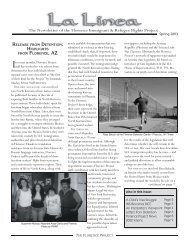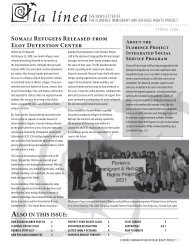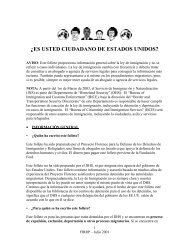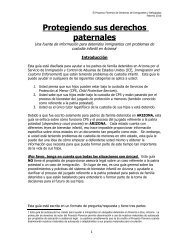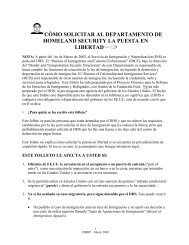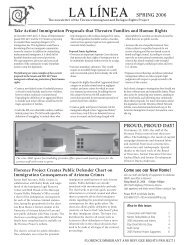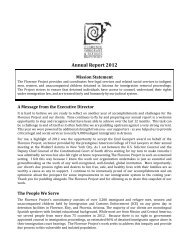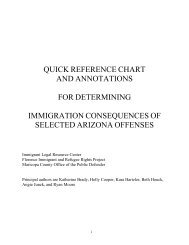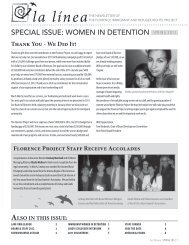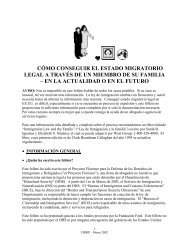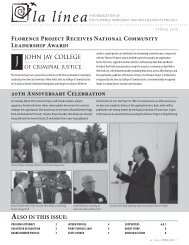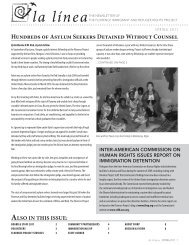HOW TO APPLY FOR ASYLUM - The Florence Project
HOW TO APPLY FOR ASYLUM - The Florence Project
HOW TO APPLY FOR ASYLUM - The Florence Project
Create successful ePaper yourself
Turn your PDF publications into a flip-book with our unique Google optimized e-Paper software.
Although it is important to include many details in the forms and in your declaration, it is more important not to<br />
state facts you are not absolutely sure about. If you do not remember if something happened in June or in July,<br />
but you do know it happened during the summer, put that it happened during the summer. If you do not know<br />
the distance in kilometers between your town and the capital, but you do know that it takes a full day by foot,<br />
put that. If there were between 4 and 6 men, do not put 5, put "between 4 and 6." If you think something<br />
happened in 1992, but it is also possible that it was 1991, put "1991 or 1992." If a certain date is your best<br />
guess, put "approximately," even on the forms. In addition, make sure that whatever fact you put in your<br />
declaration is the same as what you say at your hearing.<br />
Many people have these problems for cultural reasons. People in the United States think in order of what<br />
happened, that is, first this happened, then this, and then that. In your culture, it may be that this order is not as<br />
important. But you have to explain your case to a judge in the United States, and for this reason, you have to<br />
force yourself to think like him or her. So, try to be precise. Even if you can not remember the year something<br />
happened, try to remember if it was before or after some other event and to put the events in order and always<br />
tell them in this order. It may help you to make a list that you keep for yourself in which you put in order each<br />
event that you want to put in your declaration. For example: 1) I was born in 1962; 2) My family moved to San<br />
Marcos; 3) <strong>The</strong>re was a massacre in the town of Santa Lucía, etc.<br />
> Mistakes in translation <<br />
When translating from one language to another, it is easy to make mistakes. If someone translated your<br />
declaration into English for you, ask the person to read it back to you slowly in your own language so that you<br />
can be sure there are not any mistakes. It is important to review everything in your application form and<br />
declaration very carefully.<br />
Some Questions in Part B<br />
Remember to write “Please see declaration” at the end of each question in Part B if you plan to do a longer<br />
declaration as we have suggested.<br />
Question 1 asks why you are applying for asylum. You should check one or more of the boxes (Race,<br />
Religion, etc.) that apply to you because there may be more than one reason that someone mistreated or<br />
wants to mistreat you. For example, it is possible to be persecuted because of your race and membership in a<br />
social group, or because of your membership in a social group and your political opinion.<br />
You should explain why you are afraid to return to your country and why you left your country in questions<br />
1.A. and 1.B. Many people make the mistake of saying that they came to the United States because they want to<br />
work and get ahead. Others say they came to reunite with their family members. Remember that the purpose of<br />
asylum is not to protect poor people who want to work, nor to reunite families. Its purpose is to protect people<br />
who are persecuted for one of the five reasons discussed above. So, while you do have to tell the truth, you do<br />
not have to mention every single reason you came to the U.S., unless it relates to a fear of persecution due to<br />
one of the five grounds or a fear of torture. If you are applying for protection under theCAT, you should include<br />
in your answer to this question why you fear you will be tortured if returned to your country.<br />
Question I. A. asks if you, your family, or close friends or colleagues have ever experienced harm or<br />
mistreatment or threats in the past by anyone. If you answer "no," it would appear that you may not qualify<br />
for protection, and you will need to explain why you think you would be mistreated or threatened in the<br />
future if you have not been in the past. If you check, "yes," you should explain in detail what happened,<br />
Page 24 of 49<br />
FIRRP- last update June 2007



